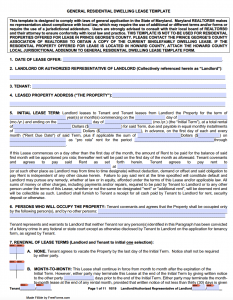
The Maryland lease agreement imposes a written arrangement to solidify the transaction allowing the right of use for a designated piece of real estate in exchange for monthly compensation. Negotiation is typically explored within reason, regarding price and various provisions. Keep in mind that management companies for multi-unit properties may have policies in-place deemed non-negotiable.
Rental Application – A pro forma designed to achieve accurate information on a person applying to lease a home. The data is gathered to attain an understanding of the applicant’s qualifications for renting the home.

Maryland Association of Realtors General Residential Dwelling Lease Template – The statewide document used to record a real estate rental transaction. This Maryland form can be employed to report the details of the arrangement in all but Prince George’s county.
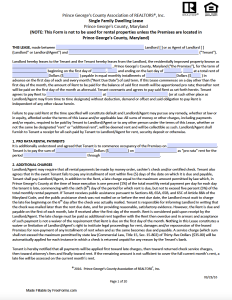
Prince George’s County Association of Realtors Single-Family Dwelling Lease – The leasing materials created by the association of realtors specifically for use in Prince George’s county. The leasing form covers all essential facets of the accord and legalizes the understanding in writing.
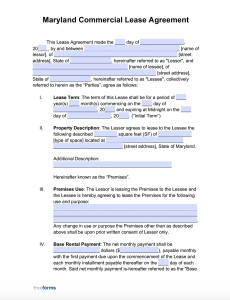
Commercial Lease Agreement – Manages the explanation of terms and conditions for a business to procure space to be used for a stated duration and price.
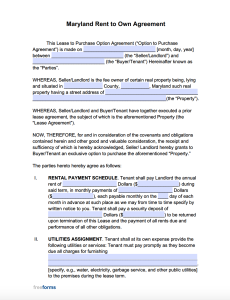
Lease to Own Agreement – Administers a contract to rent a dwelling for a signified period and payment amount. There is a promoted option at lease termination to purchase the home.
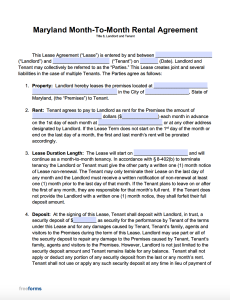
Month-to-Month Lease – Submits a standard lease agreement with the allotted provision to end early with notification of thirty (30) days prior.
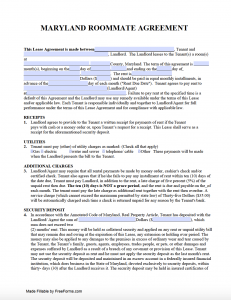
Roommate Agreement – Enforces the legalities for an individual to occupy a domicile, permitting the use of private and shared spaces for a monthly fee.
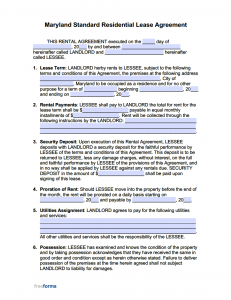
Standard Lease Agreement – Upholds a written registry to establish the rights and responsibilities gained in the lease of domicile.
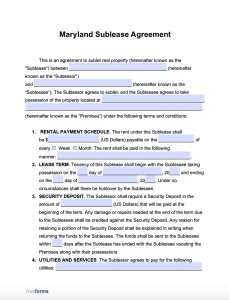
Sublease Agreement – Appoints a contract to specify the provisions of the agreement for a tenant to rent to a subtenant for a determined dollar amount.
The statutes made available in the General Assembly of Maryland Annotated Code – Title 8 – Landlord and Tenant cite the up-to-date information regarding lessor/lessee involvement.
Identification of the Landlord or Authorized Personel ( § 8-210) – The names, addresses, and telephone numbers of the landlord and all other individuals authorized to manage the premises must be included in the lease agreement. If the contact information is not covered in the signed lease, then it must be placed in a prominent view in the building.
Move-in Checklist ( § 8-203.1) – The tenant has the right to inspect the leased dwelling in person with the landlord within fifteen (15) days of notification. The completed list is to be utilized in comparison to the physical state of the residence at the end of the occupancy.
Utility Payment Structure ( § 8-208) – The arrangement concerning shared utility service payments is required to be organized in the lease agreement. The document must additionally include language referring to the condition of the property as being fit to occupy.
Receipt of Security Deposit ( § 8-203) – A written document relaying the amount of a security deposit paid to the owner of leased property is to be given to the tenant upon payment. The receipt must include information on the rights of the tenant to perform an inspection of the property with the landlord or managing agent. The paperwork must also include the other various rights put forth by the Code of Maryland § 8-203.
Lead-Based Paint (42 U.S. Code § 4852d ) – Disclosure of the potential for exposure to lead-composed paints is mandated to be notified to possible tenants of rental units constructed before 1979. A brochure containing an explanation of the symptoms and precautions to take are required to be handed out at the time of lease endorsement.
The state of Maryland does not lay down a legally permissible amount of time in which rental payments can be paid late and avoid penalty. Inspect the leasing arrangement to determine the actual due date and potential charges for late payments.
For a fee to be enforceable, it must be incorporated into the executed leasing paperwork. The highest amount a landlord can demand as a fee on late rent is 5% of the total monthly premium for rental payments paid each month. For leased properties paid by the week, the most a landlord can charge is $3 per week or $12 per month ( § 8-208).
There is no set limitation on how much an owner can request as a fee on returned checks. The lease agreement must cover the charge within the signed testament for it to be a legally justifiable claim.
State statutes dictate that the maximum amount that can be asked for as a security deposit on a rental property is equal to the sum of two (2) months’ rental payments ( § 8-203).
The owner is extended a period of forty-five (45) days after the termination of the lease to reimburse the security deposit to the tenant. Should there be any case of sustained damage to the residence, remedial costs may be taken out of the deposit and retained by the owner ( § 8-203).
The landlord or management officials are required to inform the tenant should they need to enter the residence for repairs or maintenance issues. State regulation does not compel a determined amount of notice to give a tenant, but at least twenty-four (24) hours of warning in advance is suggested.